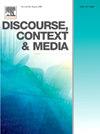Context in abusive language detection: On the interdependence of context and annotation of user comments
IF 3.1
2区 文学
Q1 COMMUNICATION
引用次数: 0
Abstract
One of the challenges for automated abusive language detection is combating unintended bias, which can be easily introduced through the annotation process, especially when what is (not) considered abusive is subjective and heavily context dependent. Our study incorporates a fine-grained, socio-pragmatic perspective to data modeling by taking into consideration contextual elements that impact the quality of abusive language corpora. We use a fine-grained annotation scheme that distinguishes between different types of non-abuse along with explicit and implicit abuse. We include the following non-abusive categories: meta, casual profanity, argumentative language, irony, and non-abusive language. Experts and minimally trained annotators use this scheme to manually re-annotate instances originally considered abusive by crowdsourced annotators in a standard corpus. After re-annotation, we investigate discrepancies between experts and minimally trained annotators. Our investigation shows that minimally trained annotators have difficulty interpreting contextual aspects and distinguishing between content performing abuse and content about abuse or instances of casual profanity. It also demonstrates how missing information or contextualization cues are often a source of disagreement across all types of annotators and poses a significant challenge for developing robust, nuanced corpora and annotation guidelines for abusive language detection.
滥用语言检测中的语境:语境与用户评论注释的相互依存关系
自动化滥用语言检测的挑战之一是对抗无意的偏见,这种偏见很容易通过注释过程引入,特别是当被认为是(不)滥用的内容是主观的,并且严重依赖于上下文时。我们的研究通过考虑影响滥用语言语料库质量的上下文因素,将细粒度的社会实用主义视角纳入数据建模。我们使用细粒度注释方案来区分不同类型的非滥用以及显式和隐式滥用。我们包括以下非辱骂性的类别:元,随意亵渎,争论性语言,讽刺和非辱骂性语言。专家和受过最低限度训练的注释者使用该方案手动重新注释标准语料库中最初被众包注释者认为是滥用的实例。重新注释后,我们调查专家和最低限度训练的注释者之间的差异。我们的调查显示,受过最低限度训练的注释者在解释上下文方面和区分执行虐待的内容和关于虐待或随意亵渎的内容方面存在困难。它还说明了信息缺失或上下文化线索通常是所有类型的注释者分歧的来源,并为开发健壮、细致的语料库和用于滥用语言检测的注释指南提出了重大挑战。
本文章由计算机程序翻译,如有差异,请以英文原文为准。
求助全文
约1分钟内获得全文
求助全文

 求助内容:
求助内容: 应助结果提醒方式:
应助结果提醒方式:


